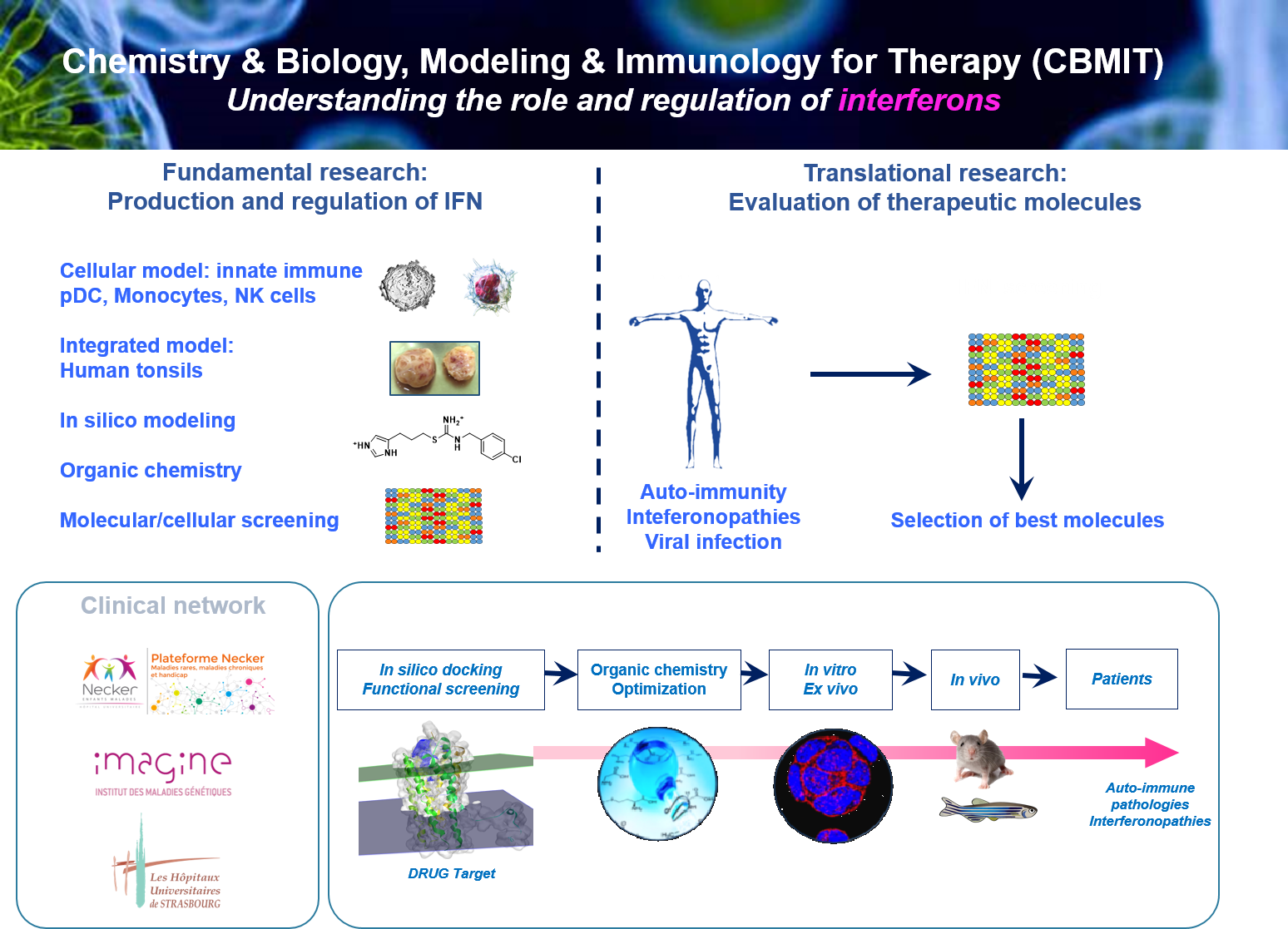Chemistry & Biology, Modeling & Immunology for Therapy
Team Composition
Jean-Philippe Herbeuval, DR
Staff
Researcher
PhD Students
Severine Grinberg
Created in 2012, the research axes of the team focus on the regulation of cytokine production during viral infection and inflammation in autoimmune diseases.
Scientific projects and goals:
- Drug discovery:
The laboratory generates and optimizes original screening assays dedicated to the identification of immune modulatory molecules. These assays are used to screen in house or external libraries.
Once identify, the lab have an establish work flow to validate lead compounds, going from in house chemical optimization, evaluation on in vitro and vivo model of inflammation and infection, to evaluation on material from patients with autoimmune disease such as lupus.
We have recently shown that some small endogenous amines regulate interferon and cytokine production in innate immune cells by engaging the chemokine receptor CXCR4. Our future projects aim to design, synthetize and characterize small compounds able to modulate inflammation through CXCR4. Furthermore, it is essential to understand the molecular mechanism by which natural amines regulate innate immunity. Our discoveries have a great potential in clinics for treating auto-immune diseases like lupus or chronic infectious diseases as HIV.

Chemistry & Biology, Modeling & Immunology for Therapy
Team composition
Researcher
PhD Students
Severine Grinberg
Created in 2012, the research axes of the team focus on the regulation of cytokine production during viral infection and inflammation in autoimmune diseases.
Scientific projects and goals:
- Drug discovery:
The laboratory generates and optimizes original screening assays dedicated to the identification of immune modulatory molecules. These assays are used to screen in house or external libraries.
Once identify, the lab have an establish work flow to validate lead compounds, going from in house chemical optimization, evaluation on in vitro and vivo model of inflammation and infection, to evaluation on material from patients with autoimmune disease such as lupus.
CXCR4 dependent immune regulation in inflammatory and infectious models.
We have recently shown that some small endogenous amines regulate interferon and cytokine production in innate immune cells by engaging the chemokine receptor CXCR4. Our future projects aim to design, synthetize and characterize small compounds able to modulate inflammation through CXCR4. Furthermore, it is essential to understand the molecular mechanism by which natural amines regulate innate immunity. Our discoveries have a great potential in clinics for treating auto-immune diseases like lupus or chronic infectious diseases as HIV.
Main Publications
Smith N, et al: Control of TLR7-mediated type I IFN signaling in pDCs through CXCR4 engagement-A new target for lupus treatment. Sci Adv 2019
Müller J et al. Semen inhibits Zika virus infection of cells and tissues from the anogenital region. Nat Commun. 2018
Smith N et al. Natural amines inhibit activation of human plasmacytoid dendritic cells through CXCR4 engagement. Nat Commun. 2017
Science outreach
La gazette du Laboratoire : Therapies-innovantes-pathologies-auto-immunes.
CNRS inc: Une-molecule-prometteuse-pour-traiter-le-lupus .
France 2-TV5 monde: Impact du cerveau sur nos défenses immunitaires (diffusion le 1 Septembre 2017)

